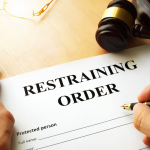A Guide to Apprehended Violence Orders in the Children’s Court

The procedures for cases brought before the Children’s Court can be quite different from those which apply to adults in the Local Court.
This is no different when it comes to cases where an application for an apprehended violence order – whether it be an apprehended domestic violence order (ADV) or apprehended personal violence order (APVO) has been made against a young person.
What is an apprehended violence order?
An apprehended violence order, or AVO, is an order made by the court which is intended to protect a person – who is known as the protected person – as well as, in some cases, those close to them, against certain conduct by the person against whom the order is made, who is known as the defendant.
Who can apply for an apprehended violence order?
An application for an AVO can be made by the person seeking protection themselves (sometimes called a private AVO), or by a police officer on his or her behalf.
When made by police, these applications often have associated criminal charges which encompass the same conduct alleged to form the basis of application.
The most common of these corresponding charges are common assault, assault occasioning actual bodily harm and stalking or intimidation.
What is the difference between a personal and domestic violence order?
An APVO relates to circumstances where there is no domestic or family relationship between the person seeking protection and the defendant, such as where they are neighbours, work colleagues, friends or acquaintances.
An ADVO is where a domestic or family relationship exists, including where the person seeking protection and defendant are married, in a de-facto or other intimate relationship, live in the same household, are family members or in a relationship of care.
What is the difference between a provisional, interim and final apprehended violence order?
An application for a provisional AVO can be made by a police officer and granted by a court or senior police officer over the phone, by fax or by email to ensure the immediate safety of a protected person.
These are sometimes called ‘telephone interim orders’ and can be granted on an urgent basis without the case being physically brought before a court.
An interim AVO is one made by the court as the case proceeds through the court system.
It will normally have effect until the case is finalised.
And as the name suggests, a final AVO is a final order by the court – whether with the consent of the defendant or after a final hearing.
What are the conditions of an apprehended violence order?
The standard conditions of every AVO – also known as conditions or prohibitions – are that the defendant must not engage in any of the following conduct towards a protected person or someone the protected person has a domestic relationship with:
- Assault or threaten them,
- Stalk, harass or intimidate them, or
- Intentionally or recklessly destroy or damage their property, or harm an animal that belongs to them or is in their possession.
Additional orders can be made as the court sees fit which can regulate conduct such as contact, physical proximity, associations and recovery of property.
The Children’sCourt
The Children (Criminal Proceedings) Act 1987 is the main piece of legislation which prescribes the rules relating to cases involving young persons in New South Wales, including the processes and procedures in the Children’s Court.
Under the Act, the Children’s Court is required to balance the need to ensure the safety and protection of individuals against promoting the rehabilitation of young persons, particularly in situations where there are no allegations that are ‘serious offences’ or charges that are of a sexual nature.
There is a heavy focus in the Children’s Court on addressing any underlying issues that may have contributed the young person’s offending and thereby promoting his or her rehabilitation.
This is different from the Local Court where less emphasis is placed on rehabilitation and more on deterrence and punishment.
The first mention date
When a young person first appears in the Children’s Court on the ‘mention’ date (a court date of an administrative nature) for an apprehended domestic or personal violence order application, the court will ask and enquiries will be made to confirm if the young person is willing and suitable to commence counselling, or other similar intervention to address the issues that led to the matter before the Court.
This could include completing programs or attending and participating in services such as family or relationship counselling, anger management or mediation.
What happens if I consent?
Some Children’s Courts have Court Support Officers (CSO) who are trained to carry out a brief assessment on the young person’s suitability for counselling and intervention.
The assessment can also include an assessment on the suitability of the young person’s family to also engage in similar services– this means that the CSO may also need to speak with family members to ask a few questions.
If there is no CSO available at the courthouse, then the young person’s lawyer can make enquiries to determine if the young person would be suitable for certain services, as well as whether it would be appropriate for the young person’s family to also be engaged.
If the young person is suitable and willing to participate in counselling or an alternative intervention, then the details of the appropriate service as well as the details of the first appointment are provided to the court and recorded on the court file.
If both parties consent, then the Magistrate can order that only an interim apprehended domestic or personal violence order be made, and the application will be adjourned for 3 months to allow the young person to start attending the relevant service.
What if there are no services?
If after making enquiries, the CSO or lawyer find that there are no suitable services for the young person, then if both the police prosecutor and the young person consent, the Magistrate can make an interim apprehended domestic or personal violence order and the matter will be adjourned for 5 months.
After the adjournment
When the application returns to Court after the 3- or 5-month adjournment, the court will be provided with an update on the young person. If the prosecution confirms that there have been no breaches of the interim order, then the application can be withdrawn and dismissed by the Magistrate if both the police prosecutor and young person consent.
What if someone doesn’t consent?
If either of the parties do not consent to making of the interim order, or if the application is not withdrawn after the adjournment, then the Court can order a final domestic or personal violence order by consent or the Court can make directions for the listing of the application for a defended hearing.
These directions usually include setting a timetable for the filing of statements by the police and the young person.
There can be more court dates or mention dates to ensure compliance with the timetable (to confirm that statements have been filed and served on the other party) before the application is ready to be listed and given a hearing date.
On the hearing date, the Magistrate will read the statements that have been provided and the parties can call witnesses to give further evidence and be cross-examined if required. When all the evidence has been heard by the Magistrate, they will make an order to grant the ADVO/APVO application or to dismiss it.
Going to the Children’s Court?
If you or a loved-one is required to attend a Children’s Court in New South Wales, call Sydney Criminal Lawyers anytime on (02) 9261 8881 to arrange a free first conference with a specialist defence lawyer who is familiar with the processes and procedures in cases brought against young persons, and will use that expertise to maximise the prospects of achieving a favourable outcome.






